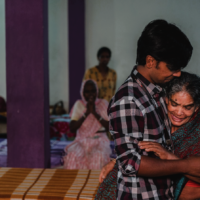CHANGE leaders do great things, and often that is all we know about them. Here we want to get a different glimpse of the personalities that constitute the development space. Every month we get one leader to answer four questions, not necessarily about their work, but about themselves. This week we catch up with H.R. Rajendra, founder of Akshaya Aahara Foundation.
Forty per cent of the food produced in India is not consumed while 194million go to sleep hungry. It’s this gap between food waste and hunger that Mysuru-based H.R. Rajendra is trying to bridge. After seeing the huge amounts of surplus food prepared for weddings and other events, Rajendra decided to do something about it.
He started at home. He told his wife to cook extra food for a friend for a few days but his neighbour caught him distributing the food to people on the footpaths. When his wife got to know, to his surprise, she said: “This is a noble cause and we will use whatever we have and feed as many people as possible.”
That was all the support Rajendra needed and Akshaya Ahara Foundation (AAF) was founded in 2013. He started with a two-wheeler, picking up surplus food and distributing it to the hungry. As the food donors increased, he started hiring autos until a well-wisher gifted him a van.
Rajendra and his small team attend to calls about excess prepared food every day from morning to evening, check the quality and distribute it to orphanages, government hospitals, slums and anyone who is in need.
Give: Describe your epiphany or the Eureka moment that led you to start Akshaya Aahara Foundation.
H.R. Rajendra: While attending a wedding a few years ago, there was heaps of food left over after most of the guests had already eaten. When I asked one of the servers what will happen to the surplus food, he simply pointed his finger towards the sky to say, only God knows.
I come from a small village where I have seen farmers toil every day to produce food grains. So to see so much of it being wasted was something that I couldn’t let go of easily. When we were heading back from the wedding, we passed by another marriage hall and they had thrown some excess food on the footpath where around seven to eight children from slums were eating it. Looking at that my mother said: “Inside the marriage hall there was excess food but no one to eat it and here people who are hungry don’t have food to eat.”
In the weeks that followed my determination to do something about this had only strengthened. And I used my personal savings, whatever I had, to start AAF.
Give: Why does this cause matter to you?
R: There are so many hungry people that we pass by every day. Many feel bad for them but either they don’t have anything to give them or don’t have the time to stop and help or don’t know how to help. We often say, “But what can I do?”
I believe all of us are capable of doing something good. There are so many people in slums living in vulnerable conditions with barely ₹100 in their pockets, having to choose between a meal for the day or survival for the week. People in government hospitals who travel long distances for treatment or as caregivers, but barely have money to eat a good meal. And there are hungry people at railway stations who come to the city looking for a job or a better life.
Providing them good food, taking care of that one basic need is my way of contributing to this world, my way of giving back. Sometimes the comfort of good food is what they need to keep going.
Give: What has been the most uplifting part of the journey?
R: When we arrive with food, I see people coming towards us, running. By ensuring they eat a good meal, the satisfaction I feel is unmatched. I can’t describe that feeling. Also, the one thing I feel happy about is that I am saving national resources. By doing what I do I am making sure that the food that is produced by our farmers doesn’t go to waste. I grew up seeing farmers so I understand the kind of hard work that goes in producing each and every grain.
Give: If you could invite three famous people, living or dead, to dinner, who would they be and why?
R: I would love to have a conversation with S.G. Susheelamma, founder of Sumangali Seva Ashrama in Bangalore. She has dedicated her life towards empowering the underprivileged, especially women and children and her work has inspired me in many ways.
I deeply respect Mother Teresa for the work she did and it would be great if I could get a chance to talk to her.
Lastly, I would invite Swami Vivekananda. When I read about him, I realised what I am doing now and the thoughts I have, he had already spoken about it during his time. I find that motivating.
– Interviewed by Aisiri Amin
To help Akshaya Aahara Foundation feed 50,000 families for two months, please donate here.
Established in 2000, Give is the largest and most trusted giving platform in India. Our community of 2.6M+ donors have supported 2,800+ nonprofits, impacting 15M+ lives across India.

Give exists to alleviate poverty by enabling the world to give. Established in 2000, Give, together with its partners, is the largest and most trusted giving platform in India. Give enables individuals and organizations to raise and donate funds conveniently to any cause they care about, with offerings including crowdfunding, corporate giving, cause marketing, and philanthropy consulting. Give’s community of 2.6M+ donors supports 3,000+ verified nonprofits, serving 15M+ people across the country.
Discover more from give.do
Subscribe to get the latest posts to your email.




